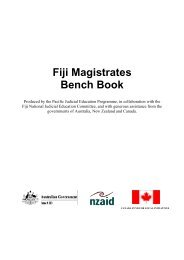Tuvalu Island Courts Bench Book - Federal Court of Australia
Tuvalu Island Courts Bench Book - Federal Court of Australia
Tuvalu Island Courts Bench Book - Federal Court of Australia
You also want an ePaper? Increase the reach of your titles
YUMPU automatically turns print PDFs into web optimized ePapers that Google loves.
Assistance for the young person<br />
Usually, it is not wise to take a plea without the young person’s parent or guardian being present.<br />
This is because:<br />
• they can give useful advice to young persons; and<br />
• they usually have valuable information on the young person’s position – whether they are<br />
attending school, getting into trouble with the Police, and whether they are living at<br />
home.<br />
It may be a good idea, when you have called the case, to ask the young person where his or her<br />
parents are.<br />
If the young person is 15 or 16, and the charge is a simple theft, you may wish to deal with the<br />
case there and then. But <strong>of</strong>ten it is not as simple as that and <strong>of</strong>fending is a sign that things are<br />
not well at home. Be careful about this.<br />
Many <strong><strong>Court</strong>s</strong> do not have lawyers who can assist young persons. It is best if a lawyer can be<br />
found to give advice and sometimes the case needs to be put <strong>of</strong>f to allow this to happen.<br />
What a young person should have (in view <strong>of</strong> age, and usually a poor understanding <strong>of</strong> the legal<br />
process), is the ability to talk to someone and to have someone speak on their behalf if this is<br />
what they want.<br />
This could be a parent, other relative, social worker or some other <strong>of</strong>ficial. It is worth finding out<br />
if someone like this is available to talk for the young person.<br />
Remember that most criminal charges refer to <strong>of</strong>fences that may be quite hard to understand,<br />
even in a young person’s own language. Explaining what the charge is, is more important than<br />
just reading it out.<br />
Taking a plea is also quite a frightening experience, and technical words are used in recording<br />
the plea. What you need to really know is whether the young person agrees or not with the<br />
charge. Is it admitted? If it is, then that is sufficient to record a guilty plea.<br />
Use <strong>of</strong> simple language is the best practice, in order to make them understand what is going on.<br />
Note that in Simona v R [2002] TVHC 1, 01/02, the Chief Justice stated that any child in the<br />
custody <strong>of</strong> the Police has the right to have a parent or guardian present unless that is impractical.<br />
If the <strong>Court</strong> is not satisfied that the Police advised the child <strong>of</strong> its rights to have a parent,<br />
guardian or legal adviser present but went ahead with questioning, any statements made by the<br />
child should be excluded.<br />
Guilty plea<br />
See 11.4 below.<br />
<strong>Tuvalu</strong> <strong>Island</strong> <strong><strong>Court</strong>s</strong> <strong>Bench</strong> <strong>Book</strong> June 2004
















